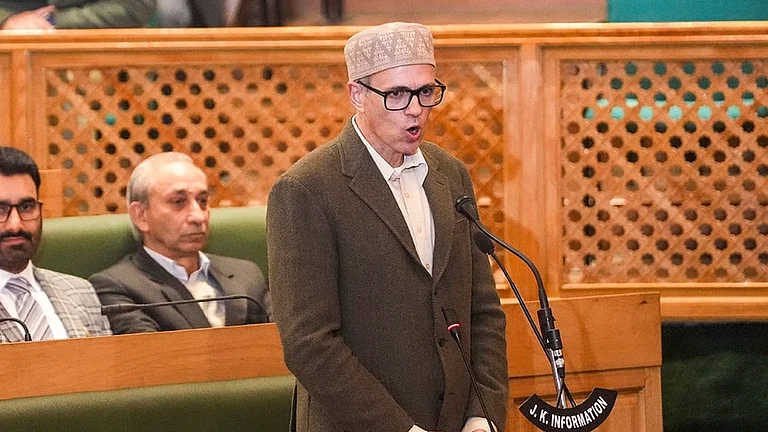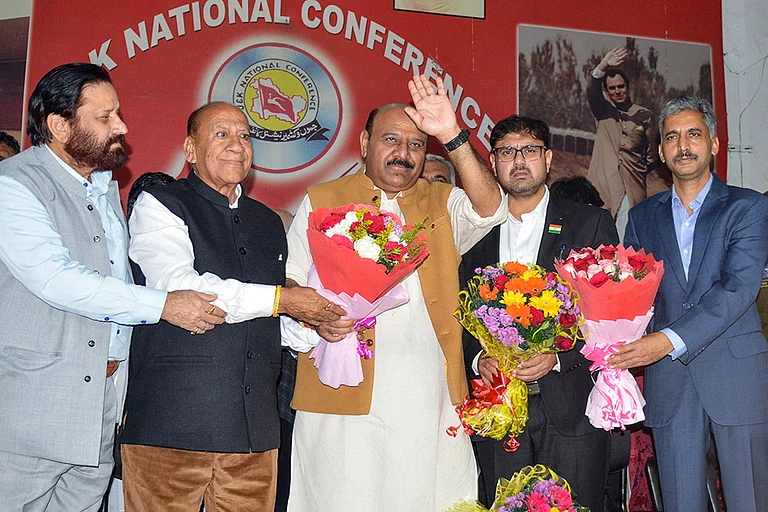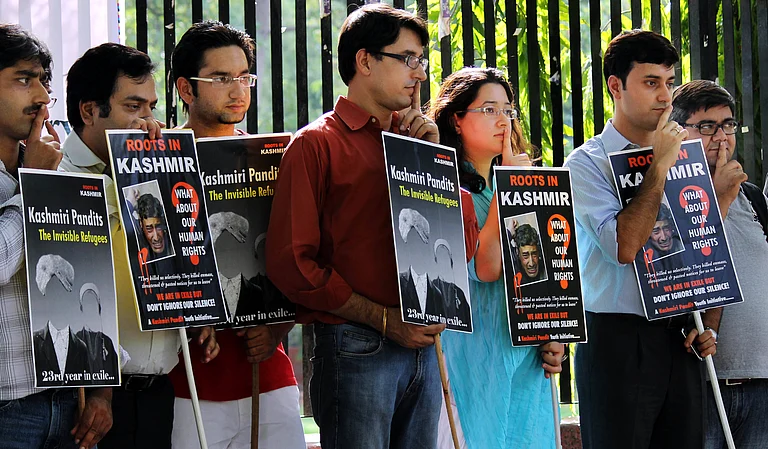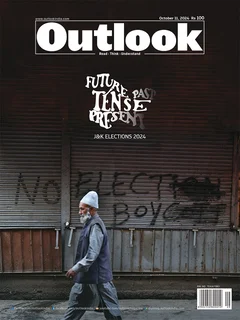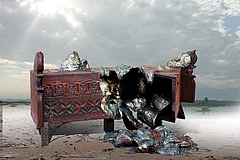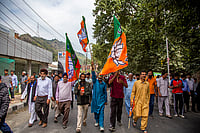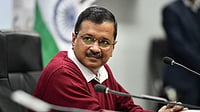This story was published as part of Outlook Magazine's 'Future Tense' issue, dated October 11, 2024. To read more stories from the Issue, click here.
As Kashmir navigates its first election post-abrogation of Article 370, a sense of hope and anticipation among the people emerges amid a complex history of conflict and efforts to restore peace. With significant voter turnout and a diverse candidate pool, this election marks a critical juncture in region’s political evolution.
In an interview with Tarique Anwar, Amarjit Singh Dulat (AS Dulat), former special director of the Intelligence Bureau, ex-secretary of the Research and Analysis Wing (R&AW) and a well-known expert on Kashmir, shares his perspective on the region’s intricate geopolitical landscape.
After retirement in 2000, Dulat was appointed as an advisor on Jammu and Kashmir in the Prime Minister's Office, where he served till March 2004. He hit the centerstage after his book, Kashmir: The Vajpayee Years, was released. In 2018, he co-authored The Spy Chronicles: R&AW, ISI and Illusion of Peace with former ISI chief Asad Durrani. In his book A Life in the Shadows: A Memoir, he has devoted a full chapter on National Security Advisor Ajit Doval's strategy of "muscular power" in Kashmir.
He reflects on the last decade, highlighting both challenges and tentative progress. He discusses the implications of a “muscular policy” in addressing unrest and the nuanced distinction between militancy and terrorism. The conversation delves into the experiences of local youth, who have become entangled in broader political struggles, illuminating the aspirations and concerns of the Kashmiri people for stability and representation.
As international attention turns to the elections, Dulat underscores the importance of dialogue, not only within Kashmir but also with Pakistan. He advocates for bilateral talks to address the region’s grievances and aspirations, aiming to understand how recent developments may reshape Kashmir’s future and impact its inhabitants.
What is Kashmir, according to you?
Kashmir is a difficult geopolitical region, which is complex and difficult to understand. It can be won with love and warmth. It is witnessing a momentous election. It is a welcome development that it is recording such a high percentage of voters’ turnout and the kind of candidates who are contesting. Everybody is waiting to see what will happen in the election. Let’s see what happens.
This is the first election after the abrogation of Article 370. A lot has happened in the past 10 years. What’s your comment on that?
It has been an up and down. There have been some positive developments, which the government always points out, like stone pelting and hartals (strikes) have stopped. It has stopped because of the initial muscular policy we have adopted. Following the abrogation of Article 370, a huge revolt was anticipated but that did not happen. Kashmiris decided not to come out and unnecessarily get killed. So, the muscular policy worked. So, we hope elections are over peacefully. Let’s see who forms the government.
I differentiate between militancy and terrorism like this–in militancy, our own boys, the Kashmiri youth, are involved. It first started in South Kashmir, which was most vulnerable. But the most difficult part of Kashmir actually is the North because that’s where infiltration takes place and has traditionally taken place. Worst terror attacks have been carried out in the North. And it gradually came to Srinagar. Now, these are largely over. But we still have to deal with terror sponsored by Pakistan.
But new areas of concern have of late emerged such as Rajauri where the Army has faced a very difficult situation time and again. It is thickly forested area. Now the terrorism has shifted to Jammu of late. Out 10 districts of Jammu, eight have been affected with terrorism.
How do you see the notion of ‘normalcy’? If Kashmir is so normal, why is there additional deployment of security forces, why are encounters taking place and why are there barbed wires, check points and detentions?
Kashmiri leaders like Farooq Abdullah, Mehbooba Mufti and others keep saying, “Where is the normalcy?” Even I have questioned this notion. Terrorism has not gone, it’s still there. Pakistan has that capability of disturbing the peace. We see it through tourism, which is doing well and thriving, but militancy will never disturb the tourism because Kashmir survives on it. Had it not been the case, it was not difficult to blow up a bus, carrying tourists. But it has never happened.
This is certain kind of normalcy, but it not the kind of peace we want to see because Kashmiris have gone quiet. It disturbs me. There has been a sort of silence. And I think what will nip this silence into the bud is this election. Once the result comes out and Kashmir has a government of its own, then the situation will change, hopefully.
In 2023, you criticised “Doval’s doctrine” for handling the Kashmir conflict with Pakistan. What is that “Doval’s doctrine”, and how is it different from Dulat’s doctrine?
I have not criticised anyone. Let me say it very clearly that Doval and I are friends. We were colleagues. We worked together. And a lot of people don’t know that we worked together in Kashmir. His way of dealing things is slightly different from mine. He might possibly be more successful. I can’t challenge Doval in anyway. He was our best operators.
It’s people who say there is a Doval doctrine, which is hardline. And some say there is Dulat doctrine, which is soft. I did not know that there was a Dulat doctrine till I met former Jammu and Kashmir Governor Satpal Mallik. I did not know about any such doctrine. I still don’t know what this doctrine is. But yes, there is a difference between Ajit and myself – he is tougher; I may be a little softer. Our former director of the Intelligence Bureau, MK Narayanan, used to say, “When I want to live with stick in Kashmir, I said Doval. When I want to offer carrot, I said Dulat.” That’s the difference between me and him.
Many Kashmir watchers, including you, were of the opinion that all peace attempts would collapse with the abrogation of Article 370. On the other hand, you once said separatism, not terrorism, and Hurriyat are all finished. Do you still believe it as Hurriyat is still there?
It was one of our takeaways of the abrogation. What the Hurriyat had thought of itself that they were big is long gone. The arrogance of Hurriyat is finished. And actually, the Hurriyat is finished. If they want to revive, they can do so because people are always there. My question is: why is poor Mirwaiz, who is the centre of the Hurriyat, under house arrest? Why is he not out in the open? Why is he not asked to contest the election?
If anyone from the Hurriyat is left, it is he. He is the main separatist leader or someone with that leaning. Most of them are finished. Pakistan is also finished, but it still remains a little factor in Kashmir. And therefore, Kashmiri leaders, be it Farooq Abdullah or Mebooba Mufti, keep saying that we need talk to Pakistan. And I agree with them.
You once said that militancy would continue to come down but terrorism will stay unless Delhi sorts it out with Islamabad and batted for dialogues with Pakistan. Many talks have already taken place. What was it outcome?
Continue talking. Every bilateral talk won’t succeed. You mentioned China; I don’t know China, I talk about Kashmir. But we can China as well; it requires a dialogue. It cannot be achieved militarily, as they cannot take over India, nor can we advance into China. It (the border disputes between Beijing and New Delhi) has to be sorted out diplomatically by opening the channels of negotiations.
The BJP governments at the Centre have consistently maintained their position of not engaging with “non-state actors”, while you continually advocate for holding talks with the neighbour.
Yes, I do, and I still believe it will happen. It has to happen one day.
Why do you believe so?
Because it is a necessity. And you will have to do it. Therefore, it will happen.
Given the Jamaat-e-Islami, Kashmir, participating in the ongoing elections after 37 years, what impact do you foresee this shift having on the broader political landscape in Kashmir? Do you think this could lead to Hizbul Mujahideen, backed by the Jamaat, shifting its strategy in any way?
The Hizb is no more a force as it has nothing left with it. There may be a few boys in the outfit, but largely it is over. Other tanzeems (outfits) like the Lashkar-e-Taiba, set up by the ISI, are also sweating away. It’s Jaish-e-Mohammad and something called Resistance Force, which are still active. They have all their roots in Pakistan.
There are continued grievances of people with regard to their survival, identity, dignity and language. How do you see it?
It has nothing to do with abrogation, though it has been accentuated by it. I have been hearing it for a long time. There is only one fear the Kashmiris have that they should not be reduced to minority in their own state. If it is not done, there won’t be any questions with regard to survival, identity and dignity.
See, Article 370 is gone, it is dead. It’s not going to come back no matter what these politicians say or claim. What is required is a commitment in Parliament by the government about restoration of the statehood. The earlier it is done, the better it would be.
You always say that Delhi has always viewed Kashmir in “black and white” and “ignored its greys”. What are the greys?
Kashmir is basically grey, and Delhi likes to see it in black and white. But the Valley is not either white or black. It is more grey. It’s in between. I once told Mirwaiz, “Aap sab log jhut bolte ho (you all tell a lie).” He replied, “Yes, but you teach us how to lie. You don’t tell the truth, so neither do we.”
It has impacted the Kashmiri character, but it is also inherited by Kashmiris as well. The Kashmiris are not easy to understand. They have different layers. And by the time you get through those layers, you will fail in understanding the Kashmiri people. It takes a lot of time and patience to understand them, and once you understand them, you will find them wonderful people.
In the light of the ongoing political upheaval in Pakistan, how do you anticipate this might affect the situation in Kashmir? Do you see any potential shift in policy or dynamics?
No, I don’t think so. They have made their position very clear by continuing with terrorism. They always have their hands in all terror attacks in India. They continue and will continue with terrorism. They won’t stop. We have seen it in Jammu, Poonch and Rajauri. It will keep happening. Sometimes, it comes down, but it won’t stop because it is Pakistan’s policy. Therefore, I say keep talking. Bilateral talk is the only solution.
While the (Narendra) Modi government’s decision to strip Kashmir off its special status brought global criticism, yet for the first time, India has invited diplomats from across the globe to observe the elections. Do you think this move will influence international perceptions of the political situation in the region?
It’s a welcome step; it is not the first time it has happened. In 2002, the Vajpayee government had done the same. He was very clear. He wanted free and fair election not only in Jammu and Kashmir and India but across the world. He had also asked the global community to go and watch elections in Jammu and Kashmir. And they had accepted the fairness of our electoral system. I hope the same happens this time as well.
What are the historical mistakes that the BJP and the Congress have committed in Kashmir?
There had been a few watershed moments in Kashmir that led Pakistan got into the region –arrest of Sheikh Abdullah in 1953, his death in 1982 and the dismissal of his son Farooq Abdullah in 1984 (a faction of the National Conference led by his brother-in-law Ghulam Mohammad Shah broke away, leading to the collapse of his government and his dismissal).
The Abdullahs are quite despised in Pakistan as it never forgave Sheikh (Abdullah) for going with India and turning down Jinnah’s offer. And therefore, as long as Sheikh was alive, Pakistan did not venture into Kashmir. They were waiting for him to die. After Farooq Abdullah took over following his father’s demise, they waited again to understand what would happen and what kind of leader he would turn out.
Everyone in Kashmir will tell you that Farooq’s first term in the office of chief minister that lasted for 18 months only was the best. After 1984, Pakistan–led by Muhammad Zia-ul-Haq– began operating in the Valley through the JKLF (Jammu Kashmir Liberation Front), the Jamaat, the Hizb, etc.
It is claimed that Kashmir has been mainstreamed. Do you think it has?
Mainstreaming is a very important part of handling Kashmir. It goes back to 1947. Delhi’s effort throughout has been to mainstream Kashmir. It first started with Sheikh Abdullah who mainstreamed in 1975 when he entered into an accord with Indira Gandhi. Now Hurriyat is mainstreamed. You mentioned an interesting thing that Jamaat is participating in the elections. Earlier, some Hurriyat people were taking part in the electoral process. Somebody is reviving all this. They are doing it for their political gains, but it won’t happen.
MORE FROM THIS ISSUE
Will the development projects like Smart City, etc. bring some change in the Valley?
That all is very good, but to restore peace in the region, the government must revive the political and democratic process. And we must restore the statehood. Not political, but the democratic process is happening now. And that’s why I hope things will change once the election results are out.
The greater normalcy will come once there is an elected government in Jammu and Kashmir. The Kashmiris complaint since the abrogation of Article 370 is that they are being ruled by the outsiders. Hopefully, that will end with the poll outcomes.
A shorter, edited version of this appeared in print







